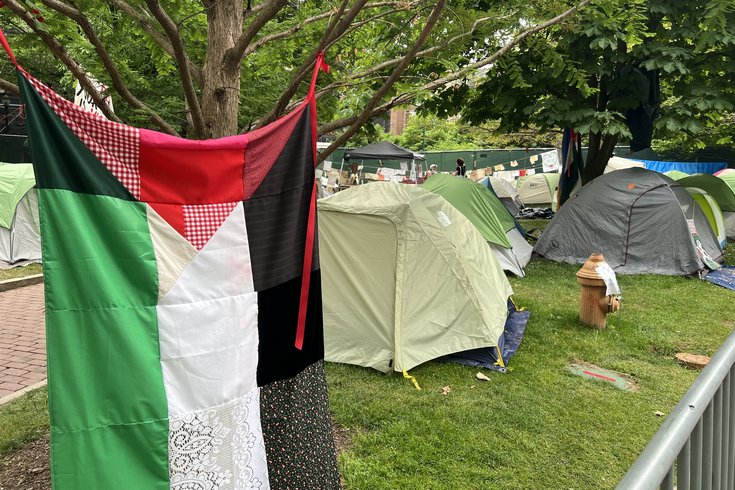
June 06, 2024
 Chris Compendio/PhillyVoice
Chris Compendio/PhillyVoice
The University of Pennsylvania's new temporary guidelines on campus protests ban encampments and overnight demonstrations. Earlier this year, a pro-Palestine encampment on Penn's College Green, above, lasted 16 days before police cleared it.
The University of Pennsylvania has adopted temporary guidelines for demonstrations that ban encampments and restrict certain forms of expression on campus.
An email sent to the Penn community on Thursday morning details "when, where, and how open expression can take place." It was signed by interim President J. Larry Jameson, Provost John Jackson and several other administrators.
The temporary guidelines will be in place while a faculty-led task force reviews Penn's existing guidelines on open expression and makes recommendations for revision. The last review occurred in 1989.
"The purpose of these temporary guidelines is to reinforce and reaffirm Penn's commitment to open expression and, at the same time, ensure that protests, demonstrations, and other expressions of free speech are appropriately managed," the guidelines read.
The guidelines prohibit "encampments and overnight demonstration" at any Penn property – indoor or outdoor. They ban demonstrations on Penn's sculptures and statues, and prohibit "structures, walls, barriers, sculptures, or other objects on University property."
The temporary guidelines are a response to the demonstrations seen on campus since last fall, most notably the pro-Palestine encampment on College Green that lasted from April 24 until May 10.
During the encampment, protesters heavily decorated Penn's Benjamin Franklin statue with Palestinian flags and a keffiyeh.
"To preserve these structures and to reduce the risk of injury, University statues and sculptures may not be climbed on or covered with any material," the temporary guidelines read.
Thirty-three people were arrested when police cleared the encampment. One week later, police arrested 19 demonstrators who attempted to take over Penn's Fisher-Bennett Hall overnight. Police said the demonstrators used barricades during their attempted occupation of the building.
In the fall semester, protesters projected pro-Palestinian messages on several buildings, which Penn denounced. Light projections on campus buildings are now forbidden without written permission from Penn administrators.
Under the guidelines, posters, banners and signs must be removed within two weeks after they were posted or within 24 hours of the promoted event. Permanent markings, including the use of spray chalk, are banned.
The temporary guidelines also have updated policies on "amplified sound," access to Penn spaces and use of social media. There are guidelines for news media covering on-campus demonstrations. People who are not affiliated with Penn are required to show identification if asked by Penn.